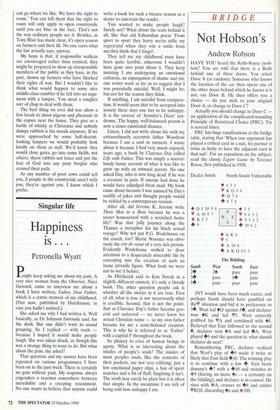Singular life
Happiness is . . .
Petronella Wyatt
People keep asking me about my pain. A very nice woman from the Observer, Nicci Gerrard, came to interview me about a book I have written, Father, Dear Father, which is a comic memoir of my childhood. (Out now, published by Hutchinson, in case you hadn't noticed.)
She asked me why I had written it. Well basically, as Dr Johnson famously said, for the dosh. But one didn't want to sound grasping. So I replied — with truth because I hoped it would make people laugh. She was taken aback, as though this was a strange thing to want to do. But what about the pain, she asked?
That question and my answer have been repeated on various programmes I have been on in the past week. There is certainly no gain without pain. My response always engenders a reaction somewhere between incredulity and a creeping resentment. No one wants to believe that anyone could write a book for such a bizarre reason as a desire to entertain the reader.
You wanted to make people laugh? Surely not? What about the tears behind it all, like that old Edwardian poem 'From sport to sport they hurry me/to stifle my regret/and when they win a smile from me/they think that I forget'.
They tell me my childhood must have been quite terrible, otherwise I wouldn't have gone into print about it. They keep insisting I am undergoing an emotional catharsis, an expurgation of shame and sin; one writer went as far as to suggest that I was potentially suicidal. Well, I might be; but not for the reason they think.
If anything, I am suicidal from exaspera- tion. It would seem that to be accepted into society these days one has to be unhappy. It is the reverse of 'Jennifer's Diary' syn- drome. The happy, well-balanced person is now a closet emotional disaster.
Listen. I did not write about life with my extraordinarily eccentric father Woodrow because I am a soul in torment. I wrote about it because I had very much enjoyed, years ago, a book by Clarence Day called Life with Father. This was simply a marvel- lously funny account of what it was like to grow up with an unusual parent. No one asked Day, who is now long dead, if he was a creature in pain. If anyone had done he would have adjudged them mad. My book came about because I was amused by Day's soufflé of jokes and thought people would be tickled by a contemporary version.
After all, did Jerome K. Jerome write Three Men in a Boat because he was a secret homosexual with a wretched home life? Was that jolly journey along the Thames a metaphor for his black sexual voyage? Why not put P.G. Wodehouse on the couch, too? Bertie Wooster was obvi- ously the crie de coeur of a very sick person. Evidently Wodehouse wished to draw attention to a desperately miserable life by retreating into the creation of such an inane juvenile figure. What fools we were not to see it before.
As Hitchcock said to Kim Novak in a slightly different context, it's only a bloody book. The other question people ask is whether all the stories in it are true. First of all, what is true is not neccessarily what is credible. Second, that is not the point. Just as Clarence Day's father became gen- eral and universal — we never knew his actual Christian name — so my own father became for me a semi-fictional creation. This is why he is referred to as 'Father' with a capital F throughout the book.
So phooey to cries of human beings in agony. What is so interesting about the insides of people's souls? The insides of most peoples souls, like the contents of their pockets, are not very edifying: just a few emotional paper clips, a box of spent matches and a bit of fluff. Inspiring it isn't. The truth may rarely be plain but it is often that simple. In the meantime I am sick of being told how unhappy I am.


















































































 Previous page
Previous page